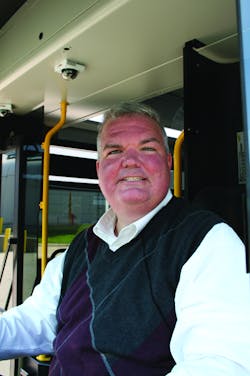Vice President & Chief Operating Officer
Indianapolis Public Transportation Corp. (Indygo)
Trever Ocock joined IndyGo in April 2007 — having previously worked for the Central Ohio Transit Authority in a leadership capacity for more than eight years — and immediately started implementing several positive changes that have greatly benefited the organization and its customers.
At IndyGo, Ocock is responsible for the strategic leadership of the bus company’s 30 local fixed route services, ADA-compliant Open Door paratransit service, contracted Green Line downtown/airport express service, vehicle and facility maintenance, safety and security, risk management and training. He and his team provide more than 8 million passenger trips on a slim $45 million operating budget.
In just four short years at IndyGo, Ocock has made huge strides in the following areas:
Operational Efficiencies
Ocock completely transformed IndyGo’s operating division, focusing on accountability, ethics, ownership and staff development. He has guided his staff in developing more than 100 key performance indicators to improve the following six areas: safety, service delivery, customer satisfaction, employee satisfaction, reliability and fiscal control. As a result, the company has experienced an 11 percent improvement in unscheduled absenteeism, a 12 percent reduction in overtime, a 5 percent reduction in preventable accidents and a climate of accountability through standardized data tracking and reporting.
Technology Advancement
Ocock successfully led the company’s $3.4 million Computer Aided Dispatch/Automatic Vehicle Location (CAD/AVL) project, which now enables IndyGo to operate more efficiently, cost-effectively and safely by using real-time satellite-based GPS information to manage company vehicles. In conjunction with this project, he also played a primary role in designing and constructing IndyGo’s high-tech radio control and dispatching center.
Service Enhancements and Savings
When dealing with the company’s reservation-based paratransit service for people with disabilities, Ocock made the decision to contract the service to an outside vendor, saving IndyGo $2.2 million and ensuring all displaced staff maintained internal or contracted employment. As part of the process, Ocock implemented state-of-the-art paratransit scheduling software as well as a taxicab voucher program for paratransit riders. Not only has the voucher program improved travel options for riders, it has also relieved pressure on an overcrowded system—cutting the cost per paratransit bus ride by 30 percent and taking on-time performance from 82 percent to 97 percent.
“In my early 20s, I received some great advice from Sarah Blouch, the director of transportation and parking services at Ohio State University and one of my all-time favorite bosses. She told me, in order to succeed in transit, you must start your career with an equal balance of education and on-hands experience. And she was right. Over a 10-year span, I worked on my college education and career simultaneously, making it possible for me to climb through the ranks at a relatively young age.”



